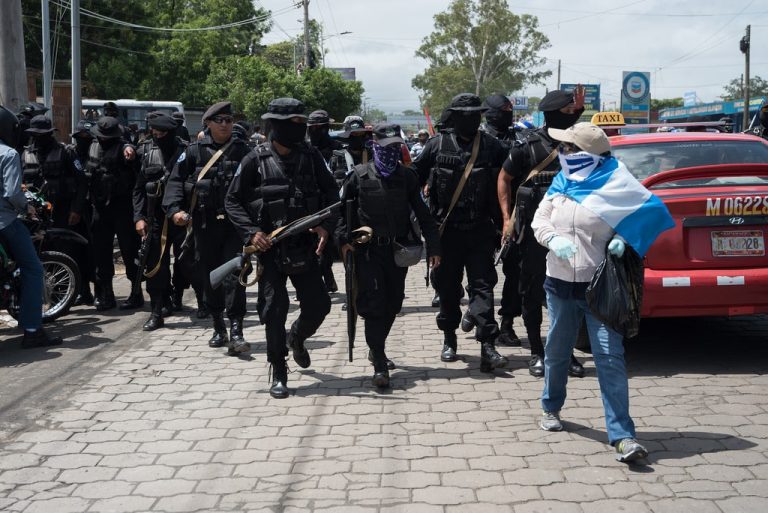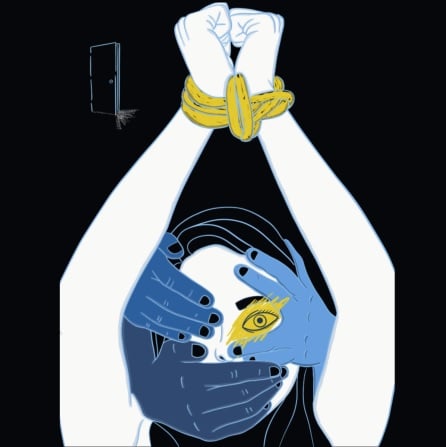17 de febrero 2021

Children of Exile: The Births “Sowing Hope” in the Camp of Nicaraguan Farmers

PUBLICIDAD 1M
PUBLICIDAD 4D
PUBLICIDAD 5D
Arbitrary detentions, laws to silence critics and “civil death” are three tactics employed to silence the population, report says

Informe del Cenidh concluye que en Nicaragua se vive bajo "un estado de terror permanente"
The government of Daniel Ortega and Rosario Murillo has “perfected their repressive apparatus” through “a series of sophisticated tactics”. These are intended to silence public criticism or demands “at any price”. So states a new report from Amnesty International.
Since 2018, Nicaraguan authorities “have pursued a policy of eradicating at any cost activism and the defense of human rights.” The strategies used for this are detailed in the recently published document: “Silence at any cost: state tactics to deepen the repression in Nicaragua”. The Amnesty International report enumerates “three tactics to stifle public scrutiny”. These are: arbitrary arrests, approval of laws that silence criticism and dissent, and “civil death”.
“For almost three years, Daniel Ortega’s government has shown time and again its willingness to do anything to prevent human rights from becoming a reality in Nicaragua. The Nicaraguan authorities must stop continuously trampling on the dignity of thousands of victims of repression.” These were the words of Erika Guevara-Rosas, Americas director at Amnesty International, during the presentation of the report.
The Ortega-Murillo regime is “waging a war against anyone who criticizes their policies. Using the courts seems to be one of their favorite weapons,” asserts the document from Amnesty International.
Since the beginning of the massive protests in April 2018, the authorities have carried out hundreds of arbitrary detentions. During these arrests, the security forces ignore the most basic guarantees. They fail to respect the presumption of innocence, and the accused’s right to detailed information about the charges against them. They also pass over the accused party’s right to a legal defense, and to private communications with a chosen attorney.
The Inter-American Commission for Human Rights (IACHR) documented 1,614 Nicaraguans who’ve been arbitrarily jailed for participating in demonstrations. These detentions took place between April 2018 and October 2020. Over a hundred such prisoners remain in Nicaragua’s jails. These regrettable facts were noted by Antonia Urrejola during the presentation of the report. Urrejola is the IACHR’s special rapporteur for Nicaragua.
“The crisis in Nicaragua is worsening. Despite (…) actions by the Nicaraguan government to produce a sensation that everything is normal, the reality is otherwise. This document from Amnesty [International] focuses on three key patterns that indicate that the country’s human rights crisis persists,” she declared.
The report cites: “lawyers representing dozens of people imprisoned for their activism”. These attorneys note “the crimes opponents are most frequently charged with currently include extortion and drug trafficking. [Lawyers] state that, in addition to punishing them, these kinds of charge seek to damage the reputation of the defendants.”
According to Amnesty International, the repressive escalation has made use of new strategies. These involve collaboration between the Legislative and Judicial powers “to generate an atmosphere of harassment and violence. The tactic is aimed against journalists, human rights advocates, and their organizations.”
The report speaks of the passage off punitive laws that threaten civil society organizations. These laws put civil and political rights at risk. They also block all paths to free and transparent elections. This, the document notes, is one of the new ways of silencing critical voices.
Lanzamos nuevo informe #SOSNicaragua
"Durante casi tres años, el gobierno de Daniel Ortega ha mostrado una y otra vez que está dispuesto a cualquier cosa para evitar que los derechos humanos sean una realidad en #Nicaragua".@ErikaGuevaraR https://t.co/63CeF8J6Zj
— Amnistía Internacional Américas (@AmnistiaOnline) February 15, 2021
Since October 2020, the regime “passed a series of laws that considerably restrict the exercise of human rights”, including the right to freedom of association and expression. Among these laws is the Foreign Agents Law and the Special Cybercrimes Law.
These laws “are instruments of repression. They give the shape of legality to all the human rights assaults they’ve been committing for a long time.” These were the words of Dr. Vilma Nuñez during the event. Nuñez is the president of the Nicaraguan Center for Human Rights.
She lamented: “We’re living through one of the most difficult times in our history.” The Ortega-Murillo regime has promoted a sharp increase in police sieges, threats, persecution, and imprisonment.
Antonia Urrejola of the IACHR coincided with Nuñez about the purpose of the series of laws. Urrejola said they were designed to “establish a legal appearance” for the government’s repressive actions against the opposition.
“This battery of laws confirms the installation of the tightly controlled environment they want to maintain during this election year. But that also runs the enormous risk of perpetuating impunity for the serious human rights violations in Nicaragua,” she stated.

From the Amnesty International report: Silence at any cost.
The report denounces the harassment the released political prisoners and their families are subject to. This constant harassment “hinders them from exercising their daily activities, such as working or studying. They continue with their activism under a situation of great risk to their life and liberty.”
Astrid Valencia is the Nicaraguan investigator for Amnesty International. She feels that the Ortega-Murillo government has surpassed all predictions, since the number of victims “continues to increase.”
“The Nicaraguan government has not only deepened, but also perfected their repressive apparatus. They put into practice a series of perverse tactics, some implemented since the beginning of the crisis and others more recent. All seek to silence any form of criticism or social demand,” Valencia warned.
Amnesty International notes that opposition members “suffer acts of aggression, intimidation and harassment by the police, pro-government armed groups and local control networks linked to the government.”
“Expressions of harassment have included excessive immigration and police checks at the borders with neighboring countries, police harassment of religious services, continuous surveillance of their homes by police officers, arrests, physical attacks, direct verbal threats from police officers, [painting] threats or the words “Golpistas” (coup instigators) on their homes and attacks or damage to their property and sources of income.”
“This constant harassment and repression is compounded by the vulnerability and legal uncertainty with which they live on a daily basis,” the report continues. Amnesty International is aware that “at least 30 of the people who were held behind bars in November 2020 were people who had been released and then re-arrested.”
The Amnesty International document was based on investigations that finalized in November 2020. They conducted 18 telephone interviews, due to the restrictions imposed by the COVID-19 pandemic. They also based the report on reviews of legal files and analysis of the new laws approved by the Sandinista-controlled National Assembly. Finally, they made use of reports from international organizations and information from journalism.
PUBLICIDAD 3M
Periodista nicaragüense, con dos décadas de trayectoria en medios escritos y digitales. Fue editor de las publicaciones Metro, La Brújula y Revista Niú. Ganador del Grand Prize Lorenzo Natali en Derechos Humanos.
PUBLICIDAD 3D